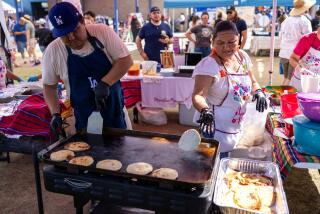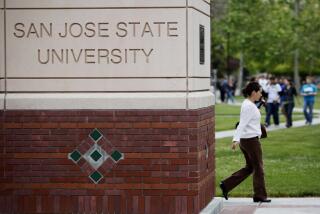Slaying of Priests Inspires Teach-In at Loyola on Salvadoran Conflict
For the first time since the Vietnam war era, students and faculty at Loyola Marymount University on Wednesday held a daylong teach-in to reflect on the brutal murders of six Jesuit priests in El Salvador and the struggle for democracy throughout Central America.
The assassination of the Jesuits last November in a predawn attack by Salvadoran army troops at the University of Central America in San Salvador provided the impetus for the teach-in at the Jesuit campus in Westchester.
“The leadership of that university, the administrative and academic leadership, was just slaughtered,” Loyola Marymount University President James N. Loughran said in an interview. “They are martyrs.”
He said the killings touched the lives of many on his campus and led to the cancellation of all classes and an unusual day devoted to large assemblies and small discussion sessions on all aspects of the Central American conflict.
“This is a big day,” Loughran said in opening the teach-in. “May our minds and hearts open up.”
A spirited but civil discussion followed about the causes and potential solutions to the 10-year-old civil war in El Salvador.
Ernesto Rivas-Gallont, former Salvadoran ambassador to the United States, told the audience of more than 800 students and faculty that deep political, social, economic, ideological and cultural conflicts that led to the civil war will not be solved without outside mediation.
“It’s been 10 years now that the country has been bleeding to death,” he said. “It’s about time it stops.”
Rivas-Gallont and Father Cesar Jerez, president of the University of Central America campus in Managua, Nicaragua, differed on what needs to occur to bring peace to El Salvador.
Rivas-Gallont said the United States is an “important player” and must continue to assist Salvadoran President Alfredo Cristiani in efforts to strengthen democracy by continuing to provide economic aid, including more financial assistance to labor unions in El Salvador.
The United States can do more by supporting the peace process than aiding the war, he said.
But Jerez singled out the Bush Administration as part of the problem. “The small countries of Central America have been considered by Washington for years as the back yard of your country,” he told the audience.
“Central America under the Bush Administration is part of a Cold War” that pits East against West.
He suggested that the United Nations, the Organization of American States and the Catholic Church must mediate the battle between leftist and rightist forces in El Salvador and elsewhere in Central America.
Jerez said he has told members of Congress that the United States must stop military and economic aid to the government of El Salvador “if it is clear that they are violating human rights.”
If the United States does not stop aid to El Salvador, Jerez urged that it be conditioned on establishment of a dialogue between the warring factions--the government, the army and the Farabundo Marti National Liberation Front (FMLN).
Both agreed that the slayings of the Jesuits, their cook and her teen-age daughter were, as Rivas-Gallont put it, “abhorrent, heinous murders” and the perpetrators must be brought to justice.
The director of El Salvador’s military academy and eight other members of the Salvadoran army have been charged with premeditated murder in the assassination of the priests.
Among those killed was the university rector, Ignacio Ellacuria and Vice Rector Ignacio Martin-Baro. All the priests were leftist intellectuals and advocates of negotiations between the U.S.-backed government and the Marxist liberation front.
“I hope the deaths of the brothers will stop what is going on,” Jerez said. But he urged the audience to consider the U.S. role in fabricating the “bullets that killed the Jesuits in El Salvador,” in the invasion of Panama and support for the Nicaraguan Contras.
Loughran said in an interview later that it is hoped the death of the Jesuits will lead to democratic reforms in El Salvador. “If we can force an honest investigation and have a fair trial and bring people to justice, that would be a crack in a whole bad situation,” he said.
Loyola student Martha Arevalo, who came to Los Angeles from El Salvador, praised the university for holding the teach-in, which she said was long overdue. “If people here in the U.S. can understand and be educated about the situation in El Salvador,” she said, “something could be done to stop the thousands of people who are dying and the whole war itself.”
Sara Martinez, a panelist who fled the war in El Salvador, expressed the hope that events like the teach-in will increase American understanding of the problems in her native country and help end the civil war there. She said many members of Los Angeles’ large Salvadoran community want to return home. “We really would like to go back under circumstances of peace and justice,” Martinez said.
More to Read
Sign up for Essential California
The most important California stories and recommendations in your inbox every morning.
You may occasionally receive promotional content from the Los Angeles Times.










